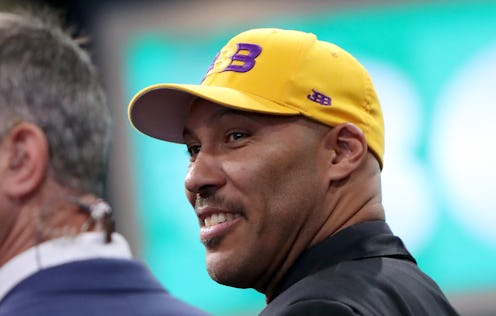News
The 'Art Of The Deal' Ghostwriter Says Trump Is "Frightened By Black People"

Many people have opinions about the current president, but few of them can say that they actually have any idea how his brain really works. When the man who ghostwrote Trump's bestseller The Art Of The Deal speaks, up, though, you listen. So now that Trump's ex-ghostwriter Tony Schwartz says that the president is "frightened by black people," we have to consider the possibility that it's actually true.
Schwartz made that claim during an interview on CNN, in which he, the host, and Trump biographer Michael D’Antonio were discussing Trump's one-sided Twitter feud with LaVar Ball, the father of one of the UCLA basketball players whom Trump helped free after they had been caught shoplifting in China and then detained. Trump has devoted several tweets over the last week to complaining first that the basketball players themselves hadn't thanked him and now that Ball hasn't shown the proper gratitude for his work in helping them to avoid prison time.
"It wasn’t the White House, it wasn’t the State Department, it wasn’t father LaVar’s so-called people on the ground in China that got his son out of a long term prison sentence — IT WAS ME," Trump tweeted on Wednesday. He went on to call Ball an "ungrateful fool."
In Schwartz's mind, Trump's fixation on this particular affront — specifically, Ball's refusal to thank the president directly — is partly due to Ball's race. "[LaVar Ball] is a tall black man," Schwarz said, "And I think Trump is half awed and half frightened by black people and his only way of dealing with them is to attack them."
Schwartz went on to say that he had seen Trump "unequivocally awed" when meeting black athletes in the past, as though he wished that he could have been an athlete like them. On the other hand, Schwartz said, "if [Trump] felt fear, he always felt aggression," which Schwartz uses to explain why Trump also felt "a need to put them down." This same feeling of ambivalence, Schwartz believes, is partly why Trump has singled out Ball of this sustained Twitter vitriol.
The other part of why Trump won't drop it is, at this point, fairly predictable. "I think he has a zero tolerance for any criticism of any kind, that’s why he goes after anybody who says virtually anything about him that’s negative,” Schwartz said.
D'Antonio agreed with both parts of Schwartz's argument, saying, "I think what Tony said was correct, that there are these dual motivations on his part. On the one hand it is racial, on the other hand he has very thin skin.” D'Antonio then went on to lay out an argument that Trump essentially "shops" for enemies that can help him with his base — and this frequently leads him to black people. "There is this desire, I think, to find the right person to go after, who fits a certain template," D'Antonio said. "He doesn't go after little guys who happen to be white ... if he can pick out a target who is different from him and who his base may also resent, that's the person he'll go after."
Trump's biographer and former ghostwriter aren't the only ones to have noticed this trend of the president's. He's attacked many prominent black people during his time in office so far, including players kneeling during the national anthem before football games and Congresswoman Frederica S. Wilson, after he found out that she had been privy to the phone call he made to a gold star widow in her district. When Trump feels that a high profile black person has been disrespectful in some way, he's made a pattern of going after them on Twitter and elsewhere. Burton is only the latest person to suffer this fate, and he's unlikely to be the last — especially now that Schwartz has offered up another reason for what could be at least partly behind these attacks.